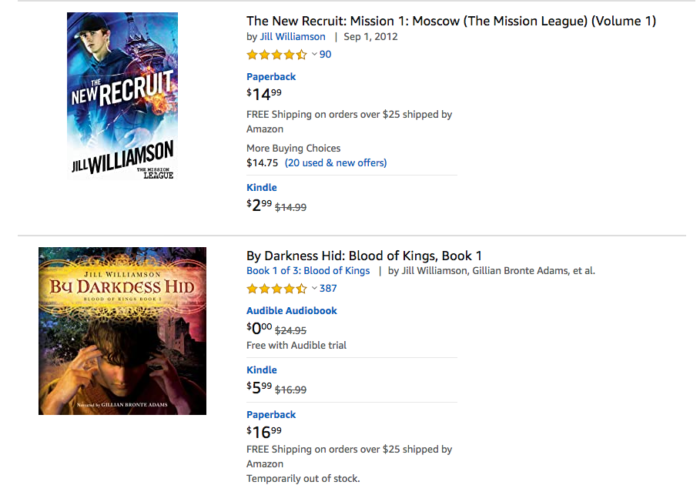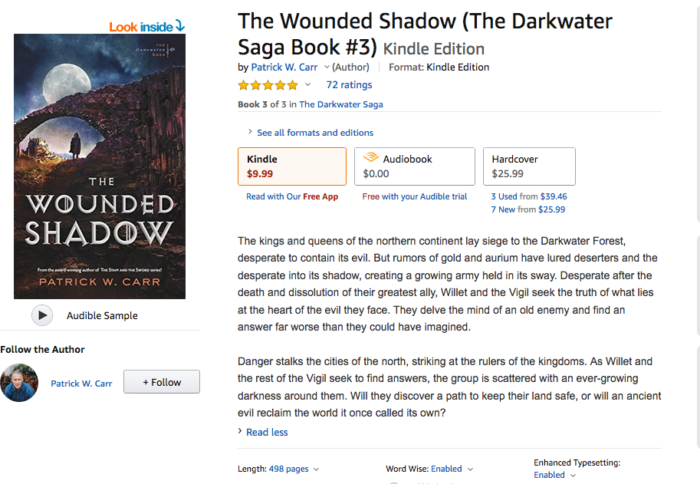Don’t Forget The Reviews
I know some people don’t care for Amazon for various reasons. There are valid points to be made about the effect on brick-and-mortar stores when a reader buys books online from any outlet. Amazon gets the attention because they are so big! But putting those aspects of buying books through the internet, the thing I like the most is the opportunity to look at reviews.
Good books generally have a LOT of reviews, and the best books have a lot of positive reviews and a high rating.
But the truth is, self-published books, books from a small, independent press, or even most books from a traditional Christian publisher aren’t probably getting rated by a thousand plus number of people. They aren’t getting more than a handful of reviews.
I’ll admit—I’m a little suspicious when a book only has a couple reviews and/or 5-star ratings. Who is making the glowing statements about the book—relatives? writing partners?
I’d like more. In fact, I often prefer to read a 4-star or a 3-star review because I think I learn more about the book when someone explains what they think was missing or could have been better.
But the main thing is, at least there are reviews I can read! Without reviews, what’s a buyer to think? If the author/publisher has done a good job, there is an adequate bit of “back cover copy” that introduces the book, that serves as a story hook. In addition, just like brick-and-mortar stores, buyers can look inside and read a few pages, which is usually the way I buy books: first the back, then the beginning.
If I want to know if the story is the kind that will hold my interest. Then I want to know if the writing will hold my interest. I am not a cover kind of buyer. Great covers can catch my attention, but I’d say the majority of covers are average, at best. And honestly, they don’t always make sense until after I’ve read the book. I’m much more apt to appreciate a cover of a book I’ve enjoyed, than I am to be lured into buying a book because of its cover.
All that aside, the biggest factor for me in buying a book is “buzz.” I’ve heard about this book, a friend has read it and now recommends I read it, or the author sends out info about his or her newest release. With the latter, reviews matter.
For instance, an author I had read before and loved, released a new book that sounded intriguing. Until I checked out the reviews. They were positive and all, but I could tell, this book was a real departure from the one I had loved earlier. I chose not to buy it.
 I’ve been burned before—an author who deviates from the types of books I love, has disappointed. Not always. I can think of others who have veered from the type of book I originally loved, and I also loved the new venture.
I’ve been burned before—an author who deviates from the types of books I love, has disappointed. Not always. I can think of others who have veered from the type of book I originally loved, and I also loved the new venture.
But that’s where reviews can help.
Just one important thing to remember: readers actually have to take the time to write the review and give a rating.
I’m a writer and I know how important reviews are to the success of books, and I still forget to write them at times. But wow! How great it is when a reader has enough respect for the author and all the people who worked on a book, to give a little feedback.
And “little” is the operative word. I mean, there are bigger, longer reviews. Usually those are at a book review site, however. The ones at a book selling site are usually much shorter. Those are great, I think, because they give a potential buyer either a thumbs up or a thumbs down idea about the book.
Sometimes the reasons a reviewer give for lowering a book’s ratings, actually make me want to buy the book. Other times I think, that issue they mentioned would probably bother me too.
In short, reviews are such an important part of book buying these days, particularly for the books that don’t make the best-seller lists. How else will readers find them unless people start talking about them? And reviews are nothing more than backyard, over the fence talk with a neighbor, saying, “I finished this book the other day and . . .”
One other thing to remember: there are sites like Lorehaven that specialize in reviews, not from the public in general, but ones that have been put out by a staff member or carefully vetted, and consequently reliable.
So there are both types of reviews to consider: ones by everyday, ordinary readers which you can find book-buying sites or at Goodreads, and ones by “professionals” who are reviewing books for a particular reason. In the case of Lorehaven, the “reason” is to let readers know which of the many speculative books written by Christians that are available these days, are ones that the Lorehaven staff can recommend.
I think the sum of both helps someone know if a book they’ve heard about is for them. Hopefully we readers can remember to do our part and help the author and our fellow readers by adding our voice to those already rating and reviewing.









































Hm…I like reading reviews, but interestingly enough I’ve been basing my buying decisions more on synopsis, the writing sample, and seeing what people say about the book during podcasts and other internet conversations. So in a way I care more about word of mouth. Though reviews do still seem to be valuable to a lot of authors and readers.
There should be balance in reviews, though. If I don’t see any thoughtful reviews that talk about downsides of a book in addition to upsides, it makes all the glowing reviews come off as fake in some way, even if they were made by people that truly read the story. That’s actually the upside to getting some negative reviews. People will see the reviews section as more authentic and believable. That’s usually why it’s better to include both pros and cons in reviews, because every story has both upsides and downsides, and it’s better to be honest about both. Though if a review doesn’t contain any negative commentary, it can compensate by thoughtfully analyzing some things the reader liked about the book. They might have to add a spoiler warning, but st least they’re highlighting genuinely good aspects of the tale.
There are challenges to getting reviews sometimes, though. Sites like Amazon of course want to prevent authors from buying reviews, but I’ve seen some indication lately that they’ve changed their ToS in a way that makes it harder for authors to utilize their review team. One author I know gives out eArcs in exchange for honest reviews, so he isn’t buying good reviews or anything nefarious like that. But he’s asked people to stop putting things like ‘I received a free copy of this book in exchange for an honest review’ on Amazon because a change in the ToS gave him reason to think that Amazon will interpret that as him buying reviews.
I think word of mouth will almost always trump pretty much anything else for me, too, Autumn. But that last nudge is often a review. Sometimes I read a few that just make me hunger for the book. Some raise a red flag or two, which might make me curious—why the debate? Which perspective will I agree with? I’ll read a book simply because of the disagreement!
Amazon, like so many other sites is becoming so politicized, so beholden to political-correctness. It is disappointing. But I say, keep trying. Authors are the ones who benefit from our efforts.
Becky
“My web browser didn’t load all the images in this article. ONE STAR.”
Or my personal favourite, “I loved everything about this article on reviews! So good and important! One star.”
Oh, my! Those are classic, R. J. I’ve seen that before—when the words simply don’t match the rating number. Or the rating and/or the review really have nothing to do with the writing and the story. They say all publicity is good publicity, or something like that. But I haven’t figured out any value from those unrelated kinds of “reviews.”
Just curious, R. J., is this why you decided over on Goodreads not to give a rating number any more?
Becky
Partly, yeah. I knew what my star ratings actually meant to ME, and I tried to clarify that in my bio. But I realized that other readers were using and interpreting those ratings very differently, so I decided the stars weren’t helpful enough to keep using. I didn’t want to feel pressured to give extra stars to a book just because people might think I hadn’t liked it otherwise, or worry that an author friend would be hurt because I gave her book four “this was really good” stars instead of the coveted “all-time favorite, will re-read with pleasure for the rest of my life, bury me with this book” five-star review.
If the reviews are truly there. According to Amazon, 15% of the reviews for my book The Light Arises are 3-star. Of course, I want to read those so I check it out. There are zero, 0, nada 3-star reviews. I must admit I’m miffed that they can say 0 reviews account for 15% of my rating. Strange math there … hum, must be new math. That’s just my little story. I myself do read and write reviews a lot. I do scan them, but, like was said, I take them with a grain of salt and base my final decision on the description.
Wow, C. S. That’s a new one to me! I’ve never heard of that. Truly disheartening, I’m sure.
I think, when it comes to Amazon, one of the important things about reviews is that Amazon (or so I understand) base their little email suggestions about what book a customer might want to buy next, on the number of reviews in the category that match buying or searching history. At any rate, I noticed a distinct difference between my two books.
Hopefully you’ll get enough other real reviews, to wipe out the non-existent 3-star ones.
Becky
It’s especially difficult to get reviews with Amazon saying pretty much everything is forbidden.
Jes, I would recommend you keep trying. After you get a little history, I think Amazon may not be so heavy handed. I’ve never had then deny one of my reviews. I try to be diplomatic. If I’m writing a review to help the author, I’m not going to rake them over the coals. But I think honesty in reviews is essential. People can see through fluff and hyperbole too easily. If I’m going to make the effort to review a book, I want what I say to matter, to help. Just my own policy: I’d rather not review a book if all I can give them is a 1 or 2 star.
Becky